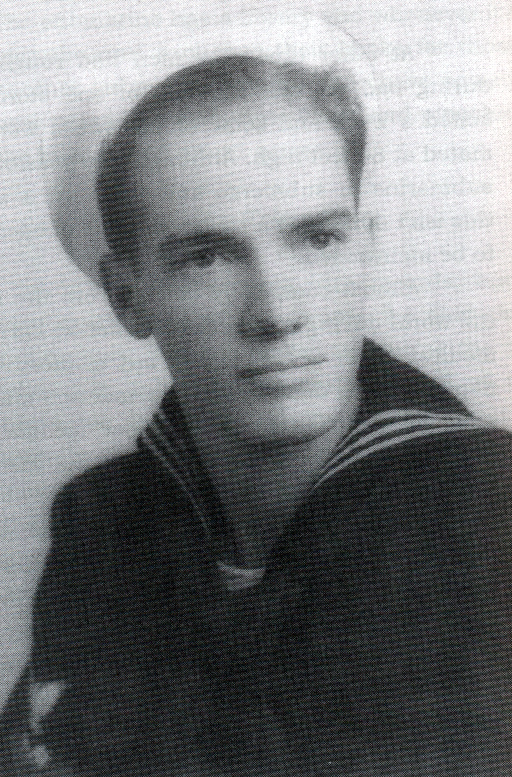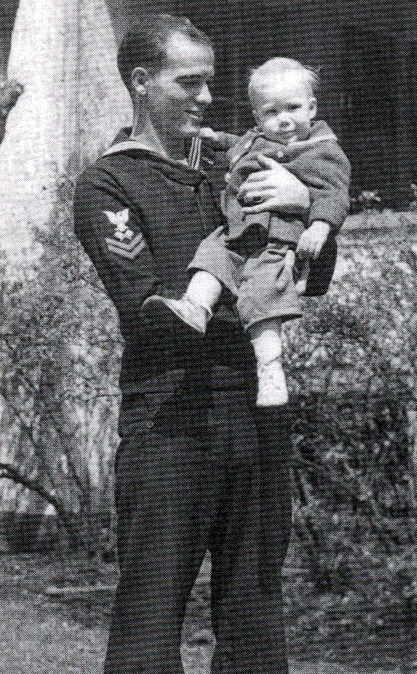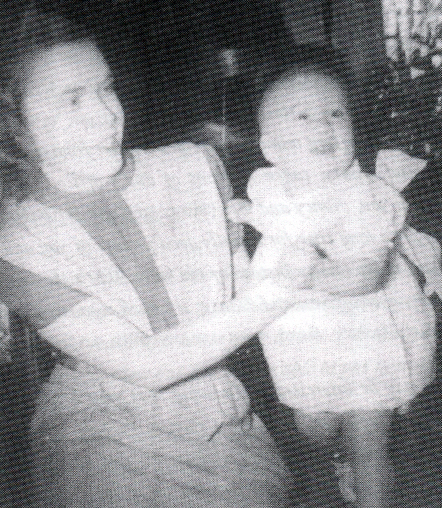
THE LOST SUBMARINER
Many descendants of Ruth and Rene Cossitt have served
their country bravely in defending our freedom.
Some have come home, others have not.
This is the story of Signalman First class William Tucker Mabin
of La Grange, Illinois, his new bride Margaret Amy (Margy) Miles and
their daughter Nancy Mabin.
Margy was the 5th Great Granddaughter of Ruth and Rene
Cossitt.
Bill and Margy were sweethearts and engaged to be
married. It was November,
1940 and the United States was not at war, but after 2 years of college,
Bill Mabin decided to enlist in the United States Navy in order to
satisfy his 4 year military commitment before he returned to college.
After basic training Bill was stationed in San Diego, CA.
We all know what happened on December 7, 1941 and it
looked like Bill would continue to be stationed in San Diego for the
near future. Margy moved to
San Diego where the couple was married in May of 1942.
Bill eventually applied for submarine duty and in August of 1942
was transferred to New London, Connecticut.
Margy returned to La Grange and lived with her mother.
She was 4 months pregnant.
In December, 1942 Bill started
his submarine duty on the U.S.S.
Balao (SS-285).
On January 11, 1943 Nancy Mabin was born, via Cesarean, and after
the Red Cross notified Bill, the Navy graciously gave him a 9 day leave.
Bill’s sailed for the Pacific theater to join the 7th
fleet at Brisbane, Australia on July 10, 1943.
On July 25, 1943 they left Brisbane on a 50 day patrol.
His second patrol started in October and lasted 43 days.
Bill’s third patrol started in December and lasted 38 days.
During these patrols they had depth charges dropped on them as
they pursued the destruction of Japanese shipping and war vessels.
Both Bill and Margy could write letters to each other,
but all of Bill’s letters were censored.
Bill would receive his mail when he was in port and at that same
time his letters to Margy would start their way to La Grange.
Every one Bill’s letters talked about the deep love that he had
for Margy and for their daughter, Nancy.
Christmas of 1943 was the third Christmas Bill and
Margy (and Nancy) were separated by the war.
Bill’s fourth patrol started in February, 1944 and
lasted 42 days. In June of
1944 Bill was transferred back to New London, Connecticut and then to
Manitowoc, Wisconsin where his next submarine, the
U.S.S. Lagarto was under construction.
For five months Bill, Margy and Nancy were a family living
together. On Christmas Day,
1944 the U.S.S. Lagarto, with
Bill aboard, reached Pearl
Harbor on its way to combat in the Pacific.
While on patrol in the South China Sea on May 3, 1945
the U.S.S. Lagarto made its
last contact early in the morning with another US submarine.
Both submarines were on the surface as the captains talked to
each other over megaphones in preparation for the next day’s combat.
The U.S.S. Lagarto was
never seen nor heard from again. Only
after The U.S.S. Lagarto
failed to show up in Australia on a pre-arranged date did the Navy start
to make an inquiry which eventually resulted in the families of the crew
being notified that the submarine and crew were missing.
The family members of the crew started to correspond
by mail and the general hope was that the crew had survived, were taken
as prisoners of war and held on one of the many small islands in the
area. As months went by
after VJ day it became clear that there were no survivors.
At the end of 12 months the Navy stopped their pay and death
benefits were awarded. Due
to the circumstances, there was no closure for the families.
On May 18, 2005 several deep sea divers discovered a
sunken WW II US submarine about 100 miles off of the coast of Thailand.
While news of this find was not broadly distributed it could be
found on the internet.
Nancy, now a grandmother, was one of the first to find this information
and with what information the Navy had from 1945, there was a good
possibility that The U.S.S.
Lagarto had been found.
As additional dives were made over time, it became clear to Nancy and
many of the other surviving family members that this was, indeed, the
U.S.S. Lagarto.
The problem was that the US Navy would not send a dive team to
confirm this find and therefore, there could be no official recognition
by the US Navy.
Nancy and several of her friends started the task of
finding as many surviving family members of the 86 person crew as
possible. Once Margy was
told of the discovery, Nancy decided, for the first time, to read all of
the letters that her father had sent her mother.
Most of the crew was quite young and not married; therefore there
were only about a half-dozen widows and a couple of dozen children
living at this time. For
many of the sailors, siblings and nieces and nephews were the only
surviving family members.
By the end of the first year after discovery, a little more than half of
the crew’s surviving families were found.
As of June, 2014, families of 73 of the 86 sailors have been found.
On May 4 to 8, 2006, the families held a memorial
service in Manitowoc, Wisconsin where The
U.S.S. Lagarto was built some
62 years earlier. While the
US Navy would not provide US flags for the family members, the VA did.
The guest speaker was Rear Admiral Jeffrey Cassias, Commander
Pacific Submarine Force in Pearl Harbor.
For most of the surviving family members, there was now closure.
Nancy was finally able to get a US dive team to
confirm that the U.S.S. Lagarto
had been found and the US Navy confirmed this fact one month after the
memorial. It was also
confirmed that the outer door to torpedo tube 4 was open and there was
no torpedo in the tube. From the
position of rudder and other devices it appears that they probably filer
their torpedo while on the surface and then dove immediately. It
was during this dive that a depth charge sunk it.
During WW II the United States lost a total of 52
submarines, mostly in the Pacific. The Lagarto was the 50th
submarine to be lost. On a few of these losses, some of the crew
survived and were taken as prisoners of War by the Japanese. Since the first discovery of The Lagarto, five other lost US
submarines have been found.

Official Navy photo of Bill Mabin (1941)

Father and Daughter

Margy and Nancy--Christmas 1943
Additional information on Bill and the U.S.S. Lagarto can be found in The Lost Submarine by Nancy Kenney ©2012.